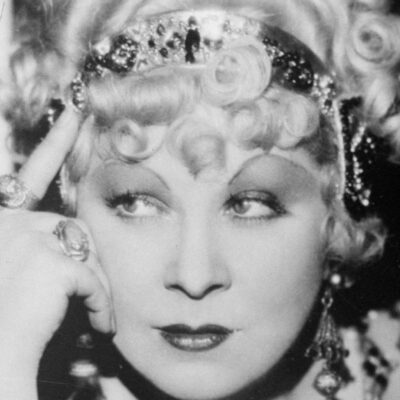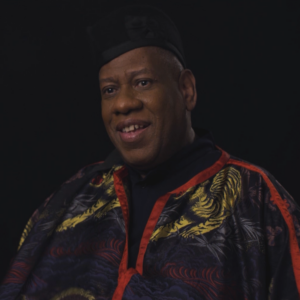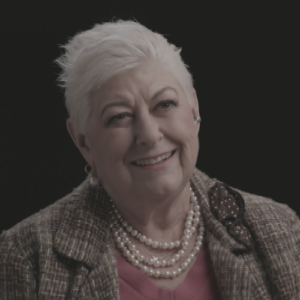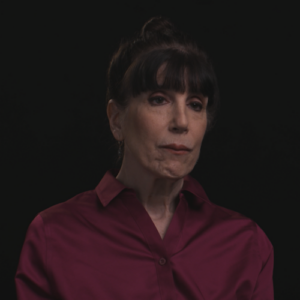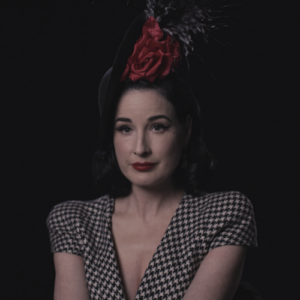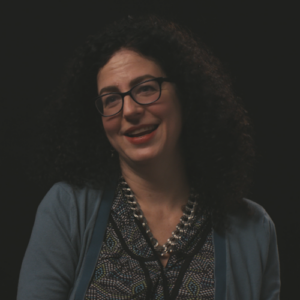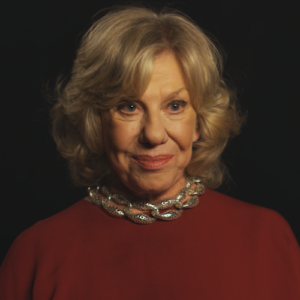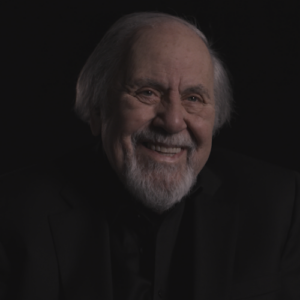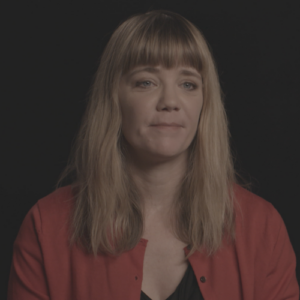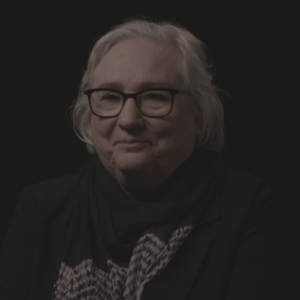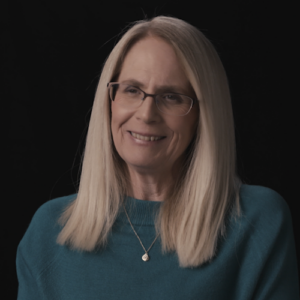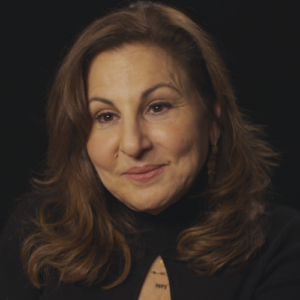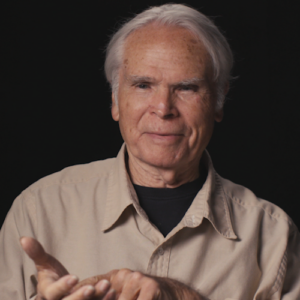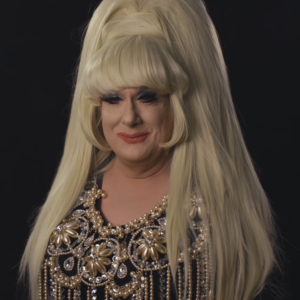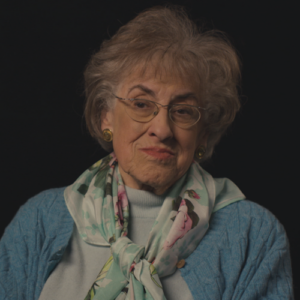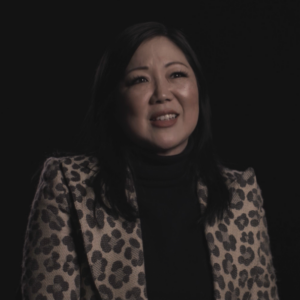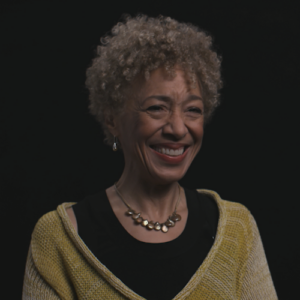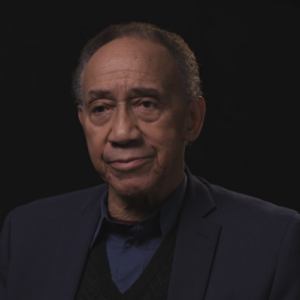Gina Barreca: Mae West was this combination of sort of glamor. Now, again, I grew up in Brooklyn, so hearing somebody who sounded like the women in the neighborhood, I mean, she didn’t sound like Katharine Hepburn. I could barely understand what Katharine Hepburn was saying, like I was, you know, a part of England Katharine Hepburn came from. You know, I, you know, was also from America. But Mae West had that, you know, that angle. And she had the attitude and she wasn’t going to take anybody’s, you know, business. She wasn’t going to let them. She was like the other ladies from the neighborhood. Except she wasn’t wearing an apron. She was wearing pearls. She was wearing diamonds. She had the last word. She was not going to let herself be bullied by anybody. She was the best version of what was familiar. But yet she came from this other world that seem glamorous and where she was in control. And she had the best answers to everybody’s line. And everybody thought that they were going to get the better of her, but she got the best of everybody that she dealt with. So she was a hero. And I remember there was a guy in my neighborhood when I was little, and I was just thinking about this when I was thinking about this, when I was taking the train up, train down, and there was a guy in the neighborhood and I think it was the dentist from next door. And he said to me when I was a kid, you’re like Mae West on roller skates. And that was a really nice line. And actually that guy, just so you know, is Judge Judy’s father. It was Mary Blume, and he always had the great lines. I grew up next to Judge Judy. It was like you’re Mae West on roller skates, that I was mouthy as a kid. And as we know, little girls were not supposed to be mouthy that, you know, you didn’t say to a little girl that one has a mouth on her. Wasn’t a compliment. Right. Because little boys were supposed to be, oh, he’s a wise cracker and oh, he is a riot and he’s terrific. And he always comes up with something to say. And, you know, he’s he’s going to go far. And with a girl that one has a mouth on her was not supposed to be. If she had a mouth on her, she was supposed to be keep, you know, keep that closed, keep her mouth shut until she was asked by somebody how to cook something or if she could help iron something. And Mae West wasn’t going to do that. So hearing Mae West in the movies, Mae West movies were shown, I think 24 seven on like the Million Dollar movies were all series of movies that would be repeated. And if I were if I was allowed to stay up late, I’d be in front of the old movie station. I would be watching her with Cary Grant and then seeing Cary Grant later as these sophisticated gentleman characters that he played or Cary Grant. And Hitchcock was so different from seeing him as this sort of vulnerable, sort of sexually vulnerable young man playing to Mae West’s older authoritative woman was was a real sort of education, because that was a reversal of all of the screen roles that women had on TV that I grew up watching. She was different from, let’s say, Lucille Ball, who was my standard everyday fare. I watched I Love Lucy constantly, but yet there was something of Lucille Ball that wanted to be Mae West. When Lucy would dress up in the fancy outfits, or when she wanted to be the chorus girl where she’d come out in the fake jewelry. She wanted to be Mae West, but there was only one Mae West. Mae West was sui generis. There was anybody who vamped it up was then imitating Mae West because she set the mold. She was the one who initiated sort of American, particularly American sexuality and voluptuousness and humor into place. And anybody else who picked up on that role, male or female, was then compared to Mae West. And I think absolutely, she got the patent on it.
Interviewer: That’s great. I’m going to make an adjustment. So if I – how would you describe to her to somebody who never heard of her.
Gina Barreca: Never heard of Mae West, that would be a real initiation. Mae West was sexy without being erotic. That the erotic girl, the flapper, let’s say she was, in a way, the anti flapper, although she was around at the same time. The flapper was the girl in front of the bar where somebody else was buying her drink. She was this deeply neurotic, tiny, skinny, terrified, shaky Zelda Fitzgerald. Don’t look sort of inside her mouth, biting, never knowing what to say, afraid of saying the wrong thing, then drinking too much and saying too much and absolutely defying things. And she was going and finally burst into tears and break a glass and. Mae West would be like, Honey, if you break my glasses, you can pay for them, you know. She was behind the bar. She was rent. She was the owner of the bar. Again, she was bountiful. There was enough of Mae West to go around. Unlike so many of the female characters, where especially because female sexuality was supposed to be something that was valued because it was scarce. With Mae West, you always felt that there was enough to go around. It’s not like her sexuality. It’s not like feminine sexuality was like a piece of soap that wore out when you used it. It was like a piece of gold that became more valuable as you polished it up. So it got better. When it was put into play. It was a kind of currency that increased in value as it was passed around and that she always remained the full owner of her sexuality, of her intelligence, of her wit, even when there was a very attractive and powerful man in her life. It wasn’t like she was ever giving something up. So that in one of those wonderful scenes where there’s a man who’s embracing her and saying, I love your eyes, I love your hair, I love your shoulders, I love your skin. And she’s like, You’re making a pass. You’re taking an inventory. You know, you’re doing an audit. I mean, that she is. These are hers. It’s not like she’s going to give herself over to somebody else who’s then going to possess all these parts of her. She could rent herself out, but she’s keeping the lease. I mean.
Interviewer: That is such a good. Did you just come up with that or is that something you.
Gina Barreca: Know, it’s like, hey, it’s it’s the truth is I just tell the truth.
Interviewer: The idea about a bounty, about sexuality is a limited reason. Such an interesting. Oh, good. And like, oh, yeah, it’s. It’s great. You. But in your first answer, you made reference to her being quintessentially American. You elaborate on that?
Gina Barreca: Yeah, that. That I would say that the Mae West character like Anita Luce’s Lorelei from Gentlemen prefer blonds are quintessentially American characters. They don’t have British, even sexy French or sexy Italian counterparts, let alone German, Norwegian, Swedish. We won’t even go into sort of early Bergman ideation. But that they were are they were part of a sort of a frontier, if you can put it that way, of American female sexuality. They were also they had a sense of manifest destiny. And their manifest destiny was going to be that they were going to again, have their own ownership of territory and they were going to mark out their own territory. They were not going to abide by the scripts that were written for them by other people. I mean, literally, that was true for Mae West. I mean, so that when she wrote Go West, Young Man, I mean, her name is on that script. I mean, they actually like Katharine Hepburn. She was one of the people who owned her intellectual property. Right. That unlike just giving that over to other people in production, that that that was part of hers. So that I think that the the American part of her was this there was nothing aristocracy aristocratic about her. So there was nothing ever Socratic about Mae West. She might have money, but the money she had, she either made herself entirely on her own or she made herself by sort of being the object of such generosity from the gentleman in her life that she still earned her money. It was brought that way, one or the other. She earned her money and that she was going to again take over that land. She was going to have ownership of that and that she was going to push the frontiers. And so that go west young man is really the perfect sort of title for her. And it’s what she was doing. She was taking over and she was going to get more and more so that there was a grab. Not only was she being grabbed, she was grabbing back. She was going to take stuff and walk with it and it was all going to be portable property. And that was. If a gift was given to her, that gift then became something she owned. It was not something that she then felt she had to return or give back or share, so that when in one of those wonderful lines, somebody comes up again, the aristocratic lady, those were the the others that she was put up against, so that it was the women whose money came only from being married to men or having inherited it from their fathers, which was an entirely different figure than Mae West had, where she had both sort of sexual and fiscal autonomy and independence that she wouldn’t. The woman comes, goes. My goodness, what pearls? She says, this aristocratic outfit. And of course, West says goodness had nothing to do with it. And I mean, it’s that it’s the refusal to accept somebody else’s idea of what morality is, not only sexual morality, but also sort of financial ethics. It’s like, yes, whatever I did translated into this and this translates into currency, this translates into money, and money translates for women into autonomy, and it translates into being in a place where she cannot be judged, or if she is judged, she doesn’t care about who’s judging her because they can’t take it away from her. It’s hers.
Interviewer: I love that you mention that you wrote your affinity for her as a Brooklyn. What can we talk a little bit more about the fact that she because she could have lost the accent. She could. A lot of people went to Hollywood and did. What did it mean that she kept it?
Gina Barreca: What does she mean that she kept the Brooklyn accent? Well, as somebody who also has kept her Brooklyn accent, I love that she did not go all middle Atlantic. That she. I think that’s one of the it’s actually a really interesting question. I think that it indicates her refusal to leave or try to transcend her financial her class. She wasn’t trying to pretend not to have been a poor girl. Right. Rich people, you don’t know where they come from. You always know where poor people come from because they sound like where they come from. I’ve taught English for 31 years and no one has ever said, Dr. Baraka, what part of Connecticut do you come from? Everybody knows exactly where I come from, but everybody could tell where she came from. But what was important is that where she came from was where she was going. And in fact, it made more of a difference that you could tell where she came from and that you could locate her in the same way that it did for, you know, people who the same way that it did for people who were decidedly from the South or the Minnesotans when people used to make fun of me. So to access that, if you could identify where somebody came from, it meant that they were carved out of the place, that they were constructed by the neighborhood, that they were made by the class, and that they refused to allow themselves to be ironed out to fit into the fashion of the day or into a more wrinkle free, less identifiable position within the culture. And so that she remained always on the margins of the culture, always on sort of a dangerous edge of the culture. She was always and thus the transgressing obscenity laws are coming very close to doing that, that she was always on the edge of things so that it was difficult to place her. And that’s part of the tension that made us so fascinated by her. She captured our imagination because we wanted to see just how far she could go and still get away with that. And she still goes I mean, we watch those old films and they are salacious. I mean, they’re filthy. They’re great because she is it’s it’s one button away from obscenity. It’s one lick of the lips away from being shut down by the censors. And you can’t censor an eye roll. You can’t censor a hand on a hip. And that’s why so much of it is her use of her body in a way that that gives access and delight. And it’s because of her delight in herself that I think we’re allowed not to see it as dangerous, but as an amusement park. It’s not that a woman’s body is a temple for Mae West. Her body is an amusement park. I mean, and, you know, get a ticket, honey, we’re all in for the ride. And it’s not so it’s not a sacred place. It’s not, you know, something that needs to be worshiped. It’s not something that needs to be cordoned off. It doesn’t have to have a crime scene tape around it. It’s a place that we go to have fun.
Interviewer: That’s often you’re good at the one liners, too.
Gina Barreca: Good.
Interviewer: So. What about this idea that she you said I think she was sexy, but not erotic.
Gina Barreca: Right.
Interviewer: Explain that more.
Gina Barreca: I think that we, again, culturally identify culturally associated eroticism with women with vulnerability, that the erotic girl is the one who is really deeply emotionally unstable. Eroticism, instability or terrifyingly twinned. And I believe particularly the American imagination. And I think that that’s gone. We can look back to Edith Wharton’s novels for this. We don’t need to just look at the past 25 years, but that it’s the woman who is teetering. I mean, not just on the edge the way Mae West is, but actually teetering inside of herself and is looking for a man. Most often, sometimes a woman more, you know, currently, but usually a man to come in and stabilize her. She’s looking for somebody basically to keep her contained, because otherwise she’s going to fly off into little pieces of herself and somebody is going to have to clean her up or clean up after her. And that for Mae West, there’s an enormous sense of sexuality without that sort of terrifying little girl eroticism without neuroticism being linked to what’s neurotic, the men in her life were neurotic or foolish or silly, and they became the butt of the joke. It wasn’t that the sexy woman was the butt of the joke, as is usually the butt of almost every joke. Right. It’s one of the reasons women don’t usually tell jokes. Women tell stories, mental jokes. Men tell jokes that go to blonds, walk into a bar with a Dalmatian. And then women choose not to remember the punch lines to those jokes. And then men say, how come women can’t remember the punch lines to jokes? And then we’re labeled as not being funny and then just have you know, you ask a man to say something funny and you can go go because he’s going to say the top ten list or he’s going to do when a woman says, I got something funny to tell you. If you’re smart, you’ll sit down because you’re going to be there for 45 minutes while she tells you something that happened to her that day when she was getting out of a cab and she left her umbrella and that she had a coffee and spill coffee down her boot and she didn’t. And you’re going to be there and, you know. So women being funny is usually women having a sense of humor usually means that she laughs at a man’s jokes. So for a woman to have the agency to make her own humor and to make the man the punchline of the joke, as West often did, it was the man who was the ridiculous one, took enormous courage and took a kind of a deftness to make her into the figure that could do that, remain sexy, remain desirable, not be somebody who hated man by any means. So still remained powerful, desirable, and still got the last word. While understanding that she had experience. All of this depended on her demonstrating that she had sexual experience and that she was not ashamed of it. And that probably was the biggest taboo erasure of all, because anybody who had had sex before she was married or enjoyed it, even after she was was considered a disgrace to the sex.
Interviewer: Going back to the comedy stuff because it’s really interesting and I think it’s something we talk about now, this idea of whether a woman who’s funny. Can also be desirable by a man. You know, I mean, do you think that Mae West was desired in that way by male audiences?
Gina Barreca: Do I think that Mae West was desired? But yes, I believe Mae West was considered very desirable by men in the audience, by little boys in the audience, by many women in the audience. I mean, Mae West is just desirable. I mean, you look at somebody who’s like, looks like she would be fun to spend the evening with in bed or outside her bed. Mae West is that person. I mean, you know, she looks like she’s enjoying herself thoroughly. And if she’s enjoying herself at someone’s expense. Right. I mean, a lot of pleasure comes at the expense of others. I mean, you know, it’s I mean, everybody wants to find joy. That’s very nice. But actually to have a good time, it’s usually at the expense of others. And let’s let’s just say that out loud and the expense of others, however, that she was having her enjoyment, the the fun that West had was never at the expense of somebody who was in a less powerful position than she was. She was always kind to people who clearly had less money, who clearly had less power to everybody working for her. You had the maids in the scenes. You had anybody working in the bars that she ran? Anybody playing the piano? Those were never the objects of humor. They were never the people who were targeted. The characters who were targeted or the ones who wield power and believe usually ridiculously, that they have far more control over the world and especially overheard than they do. So they need to be the objects of humor because they need to have some humility introduced into their lives. And that’s what the humor is able to do. But she’s able to do it in a way that puts them into their place so that it’s like when, you know, you’re you’re having your best, like playing with a dog, with a sock, and you take the sock away from the dog and the dog is happy that you got the sock and is happy. Or because of that, it’s like the men in these films that I suspect the men in the audience were just delighted when she got the better of the characters, the male characters, the rich, aristocratic, powerful, pretentious, usually male characters that she was dealing with. It made everybody happy. And certainly most of the people in those audiences were nowhere near as, shall I say, well-endowed as the men in the films. And so they were happy to have somebody taken down a peg or two as well. I think it was very satisfying for everybody. But she I don’t think she was ever considered a man eater in a way. I mean, she could be somebody who might nibble around the edges of a man just to get him down to size. But she she wasn’t one of those characters like Theda Bara or one of those stars who would actually devour somebody. So that Mae West was not like a silent film. Stars or other women who were portrayed as man eaters, that she wasn’t somebody who was out to, you know, she wasn’t some somebody was going to kill her prey. She might nibble around a man’s edges a little bit in order to get him down to size, but she would never actually devour him whole and that she would do it for the fun of it. She would do it because it was delicious. She would do it for enjoyment, but she never did it with a mean spirit. She never did it with going in for the kill.
Interviewer: Great. So she was funny, but a lot of her her her comedy has to do with her being smart. Mm hmm. Can we talk about that behind, you know, word for word play And just the thing that she was really exhibiting more than sexiness was probably intelligent.
Gina Barreca: Yes. That Mae West was very smart. And as she was unapologetic about being sexy, she was unapproachable. She was unapologetic about being smart. She did not feel guilty about being experienced in the world and whether that was shown through her obvious enjoyment of her body. She has a clear enjoyment of the games of the mind as well as the games of the bedroom and the pool room and the bar room and the boardroom. I mean, she’s comfortable in whatever position she’s in and she doesn’t have to be simpering or ditzy or out of control to be attractive. And that had been the go to sort of script for a lot of femininity, right, that a woman had to be. We go back to Jane Austen for this. It would be like, if you’re not dumb, you have to play dumb. I mean, you don’t like to think that Jane Austen was saying this, but this is what was the script? I mean, this was the idea of feminine passivity were so fundamentally intertwined in the conception of male and female. For thousands of years that the idea that that could be separated out was so transgressive, it really wasn’t even considered. And so for somebody to be able to do that and still, you know, smart and funny and sexy and alluring, those are things that we usually given over to, sort of which figures to the hag figures usually. And even after Mae West, great stand up comics like Phyllis Diller, who was enormously attractive woman, made herself into this sort of hag figure. I mean, she had the glittery dresses and the pearls and the makeup and all the rest of it. It was sort of a weird mirror of Mae West. But because the idea was that you couldn’t listen to a woman being funny. And find her attractive at the same time. It was. And there are stand up comics today. You know, I’m a member of the Friars Club. I know a lot of women who actually work in standup. And the idea is that you can’t listen to a woman and find her pretty or attractive or sexy simultaneously. Sarah Silverman has talked about this. You know, working with this idea, it’s like as if one part of the brain shuts down so the other can work. In my first book, which is named after my favorite Mae West Line. They used to call me Snow White, but I drifted. Women’s strategic use of humor. I suggest that men don’t find funny women attractive because they actually can’t keep an erection and really laugh at the same time. I really don’t think they can. I think it just goes one way or the other. One part’s busy and you can’t have both parts busy simultaneously. So if you really make somebody laugh, really laugh at the middle of the act, you’re going to, you know, take that act on stage because it’s really not going to work in bed. And so that the idea that you can’t be funny and sexy at the same time, it’s never been there are all kinds of men that we consider sexy because they’re funny. Josh Rogin is not exactly a stand in for George Clooney, so we can think of men as being funny and sexy, but women as funny as sexy is still something that the culture struggles with. And Every 20 years is a new article that comes out that says, Can women be attractive and funny at the same time? And some of us are then off screen, off screen, you know, yelling, Yes, we can, but we’ve not been doing it for 20 years. So we’re eating like a pizza while we’re saying, yeah, we can be funny at the center of it. So it becomes less convincing. But it’s as if we keep needing to reinvent the idea of the funny, sexy, smart woman. And yet this one of the reasons Mae West lasts as this iconic figure is because she has always incorporated. She’s the trifecta. She’s funny and smart and sexy, unapologetic completely demonstrates her ability in all three areas while keeping all of those balls in the air in what seems an, you know, an effortless way. And we’re mesmerized.
Interviewer: This is so fun to do interviews about her.
Gina Barreca: Well, yeah, I mean, it’s really.
Interviewer: A documentary about the Civil.
Gina Barreca: War.
Interviewer: So I’m like, this is.
Gina Barreca: No, a friend of mine made a movie on Hannah Arendt. It was very different. Yeah. Yeah.
Interviewer: I mean, along the lines of comedy, let’s talk about the structure of the one liner. The one liners seems to be a kind of a masculine form. I mean, I guess probably because everything you’re saying about intelligence or whatever. But but can we talk about May and the one liner and. Sure.
Gina Barreca: The one liner I mean, the one liner, I think comes out of particularly out of vaudeville and burlesque, because people weren’t there to listen. And so if you were going to make a point, you were going to have to make it fast. You were going to have to make it poignant. Although, you know, six months before that, you were going to have to make it poignant. You were going to have to make it memorable. And you were also dealing with a lot of people who didn’t have English as their first language. So while there would be wordplay, it was going to have to be something that had the immediate sort of, you know, a tap on the the drum on the symbol. You know, right away, I mean, the symbol and the symbol, you know, both had to be sort of simultaneous. So it had to get to the point immediately. It was not going to be a shaggy dog story. And so I think for her, you could get the idea of what Mae West was saying merely by watching her. We could watch these clips in Icelandic, in Old Norse, you know, in in Japanese. We would still get the idea of what she was saying. You would just watch her body language, her expression, the toss of her head. You would watch her male counterparts expression. You could we could come up with the caption contest and probably come pretty close with a probably not do as well as she did with those one liners. She was able to absolutely capture lasso the imagination of the viewer and be very smart. And, you know, you go back to Shakespeare and sort of mirth, be it. You know, you have to do it fast. I mean, you have to be you have to be saying it as quickly as possible.
Interviewer: So but also, she had a very languid sort of movement like, you know, she was slow. Yeah. And I think there’s something I don’t know what if you can say anything about her movements, but it was almost a power thing, like it was a way to control the scene. I don’t know.
Gina Barreca: No, that’s a that’s a great out there.
Interviewer: Anything you can say about her delivery?
Gina Barreca: Well, I think that yes, I think that saying it slow is right. I think that she did speak in a way that even if you were not particularly a good speaker of English or a good listener, you were following along that you were able to get her point directly. The innuendo would be there because of her movements. I believe she was actually moving slow because she was a tiny woman. Actually, she gave the disappearance of voluminous ness and voluptuousness, but she was actually very small and wearing very tight corsets and I believe very high heeled platformed heels. So she had to walk like a mouseketeer, basically. You know, she had to walk like one of those covered animals that can only go at very small times. I think Dolly Parton has a similar sort of set of movements, and she is another very voluptuous, very tiny lady. And so there’s a movement in a certain way so that you sort of keep upright. And but that she used that to the best possible effect, because I think it did give her a sense of control as opposed to a sense of vulnerability. So that, yes, she was the one who set the timing for everybody around her, and that a man who is going to be fast around Mae West was going to be somebody who was going to be around Mae West for long.
Interviewer: Right. I think this I think this is in your book. I’m not sure. But what do you what do you think her taste in men said about her? You know, the musclemen, the cowboys, the studs. It’s like she was very into, like, this overt masculinity, especially later on in her life.
Gina Barreca: What do I think? Her taste in men? I think that it shows that she. Was not narrow minded. I think she had a was unprejudiced when it came to her different viewpoints. I think you know Rough Trade was right there with the aristocratic men. I mean, she and I think that she liked the sort of rough and ready working, you know, working man’s Ph.D. kind of guys and that that goes back to, you know, her working class background, that that goes back to her roots, that that goes back to somebody who is going to be appreciative of someone else who is trying to make his way through the world and didn’t have anything handed to him. And so that he was going to be a striver, he was going to be ambitious, he was going to know how to work. And somebody who was going to know how to work would be useful in many parts of life.
Interviewer: Right. And what do we make of the fact that she again, probably later her career after Hollywood, but she had such a following and.
Gina Barreca: I think it’s I think it’s great. I mean, I think if we look at the characters, one of the one of the parts that I really do think is is honestly very important about Mae West is that she performed femininity and so that there were layers and layers of what we imagine as the female, the womanly, the feminine, the feminist, even if it was not a word, you know, you don’t think of Mae West and suffrage. And yet all of these sort of ideas were sort of swirling around at the same time that, you know, when Mae West is writing and performing the play Sex and getting arrested for it and choosing to go to jail for it, I’m sure you had people talking about that. But that, you know, there were women who were going to jail or just come from being jail about fighting for women’s rights. I mean, you have this is going on. Well, Margaret Sanger is trying to figure out whether women should have control over their own bodies and their own reproductive functions. So you have you know, this is all part of a larger there are larger issues where women are getting very mouthy. For those women who have a mouth on them, they’re getting very mouthy about this. And even if Mae West is saying everything in this low key voice and she’s not shouting and she doesn’t need to shout because her real power comes in speaking low, that she is still giving voice to a lot of. Things that women who are in no position to speak up would really love to say. And she’s doing it in a way that they would never have permission or give themselves permission to be able to say even if they would not be shut down by censors because no one was actually listening to them. I would think of them as be worth listening to, but that she was able to articulate a lot of what was going on in the world. So she is performing femininity by over doing femininity. So that I think that she’d become a model for drag queens. But for women who are drag queens, for those of us who are, you know, put on extravagant, you know, eye makeup and many pearls and do it, you know, all the rest of it who like dressing up in this way, that really has nothing to do with a natural femininity. But, you know, before Simone de Beauvoir, she understood that you’re not born a woman. You are made one, you become one. And Mae West was becoming the woman that she realized that it was about what you put on. It was about the makeup. It was about the hair, was about how you did the voice was about how you did the look. And it wasn’t that you were born a little girl with sugar and spice and everything nice. That was the last thing you were born with. That that’s the part that you had to become. But you could also, you know, be born with some pearls, some, you know, peroxide blond, you know, a look in your eye and turn up at the corner of your cheek that that could be your version of femininity. And that had nothing to do with being born with a vagina.
Interviewer: That’s a great point. Um, yeah, I think that breaks down the drag queen story with her. Oh, okay. I had to return to comedy for a minute now. And we don’t have to do this if you can’t remember this. But there’s a Lenny Bruce joke that you tell him one of your books. Mm hmm. Really? And it’s about, Oh, yeah, we’re going to choose somebody lying.
Gina Barreca: Okay?
Interviewer: And I think that if you can tell that joke and like, what it how it relates to everything we’re talking about and this idea of sex and who can joke about it, Who can talk about it?
Gina Barreca: Mm hmm. Okay. So let’s see if I could get this right. So. And I can say blowjob.
Interviewer: Yeah, we’re going to say you can pick it.
Gina Barreca: Okay. So, yeah, an old Lenny Bruce routine, because, again, women weren’t allowed to talk about sex even when they were clearly talking about sex and having sex. Can I tell one other one that I really like? Tell one first as I’m rewinding the one that I really like from Snow White about women supposedly not being able to talk about. There’s there’s a man and a woman there. They’re in the back of a car and things start getting very hot and heavy, very fast. And they’re they’re both very passionately involved in this, but they they end up having sex. And it was this sort of surprise ending to this. This what started out just as petting. And the man leans back and says, Oh, I’m so sorry. If I’d known you were a virgin, I would have taken my time. And she said, If I’d known you were in such a hurry, I’d have to take it off my pantyhose. And, you know, because the idea was that women have no sexual experience and can’t be the judge. And men are the ones who have to be understanding and forgiving and initiating it just like that. I want to thank her off my pantyhose, but Lenny Bruce tells a joke about how women really haven’t been permitted to talk about sexual experience, at least not in public. And so Bruce’s in a coffeehouse in Greenwich Village and he’s talking about is like asks for a show of hands. This is how many guys in this audience have had a blowjob. And 98% of the men put their hand up and look at each other and they’re laughing. And it goes, okay, I’m a broads in the audience and given a blowjob. Like one woman in the back sort of raises her and it looks around. He goes. Somebody is like, hey, because it’s like that. I mean, there’s a distinct somebody is lying. I mean, this is like people are having sex. We’re talking heteronormative sex. 98% of the guys got a blowjob there. Somebody’s lying. So Mae West was the one who was indicating that maybe she wasn’t. It was not in her interest any longer to lie because she didn’t have to.
Interviewer: Great. Thank you for doing that.
Gina Barreca: I like the pantyhose show. It was like I really you know, I would take her off my pantyhose. Oh. Now. I’ve always had the oil come through. It’s like I got a call from Exxon the other day and it’s what happens and it’s really true. Everything I’m saying, I mean, I’m sure it’s true of everybody.
Interviewer: Really good.
Gina Barreca: But it’s really I really believe it. That’s why this stuff is, you know, and women still do the stand up comics, the young women. I know, I dunno if you’re talking to, but they really do. It’s like if I get up and I look good, all I hear is take it off. All I hear is show us your tits or I mean that they really do feel like they have to separate. It’s astonishing.
Interviewer: Yeah, I want to talk about that. But before we do. Yeah, I want to come.
Gina Barreca: I’ve heard that in so many other situations.
Interviewer: But, um, I mean, we’ve sort of gone over this, but, you know, the title of your, your mother, they call me. They used to call me Snow White, but I drifted. There’s also a line that she has. I’m a girl who lost her reputation and never missed it. I mean, what is she saying? Like, what is she saying with these kinds of lines.
Gina Barreca: With her one liners? Like I climb the ladder of success, Wrong by wrong. It was a girl who lost her reputation but never missed it. It is the equivalent of, you know, saying I lost my virginity, but I still have the boxer came in, you know, I mean, it’s it’s really the idea that what you think is important, you know. A non regenerative membrane called a hymen that all of capitalism is founded on because it’s supposed to ensure that your child will inherit property. And I mean hahaha. But that’s really what it’s all about, that it doesn’t matter. Mae West is saying it doesn’t matter. I’m not particularly interested, you know, in what happened to my virginity. I am not allowing you to say what value I have because of how I have decided to use my sex. And that was dramatic in terms of taking back somebody else’s possession of her esteem. I mean, she actually, you know, I mean, other people it was like really an estimate. It’s like how she would have been estimated. I mean, esteem comes from the same word, right? And so she’s taking back I mean, it really is self esteem. She’s saying, no, I’m actually I’m going to tell you what I’m worth. I’m not letting you put me up for an audit. I mean, that’s why that audit line is so important. She’s not going to let somebody else sort of decide what she’s worth on a sheet. Now, she’s slightly used, previously loved, you know, none of those things. She’s like, No, I got better by doing this a lot. You know, you’re going to appreciate this more because I know what I’m doing. And so this is the part where she is taking usually over what has been the man’s position in a relationship where he’s supposed to bring the experience of a knowledgeable lover to the bed and she’s opposed to whoever she the poor soul is, you know, lie there and think of Englander or, you know, Staten Island or whatever she’s lying there and think of. And that, you know, she’s saying, Oh, no, you know, when I’m good, I’m good, but when I’m bad, I’m better. And so she’s taking back the word bad. You know, when she’s saying too much of a good thing is wonderful so that everything she is is reframing the language used to damn women and saying, No, I’m taking that word back and I’m using it to as a flag, as a way to say I am not a space that you’re going to conquer. I’m not going to be a body that you’re going to colonial eyes and name and then own. I’m I’m a free land and you’re going to have 40 acres right here. You know, this will be just fine. But it’s she gets to decide.
Interviewer: You know, we’ve been sort of saying, oh, is she a feminist? Which because of feminism, doesn’t really matter. It’s hard to parse that. But like, is there a way in which what she was doing was way more powerful than any political rhetoric about feminism? Like, what was she doing for women that was more powerful than the political stance?
Gina Barreca: I would say I, I don’t have any problem referring to declaring Mae West a feminist, and I’ll go into the right with somebody who wants to say otherwise. And I don’t even care whether that’s what she would say about herself. I mean, somebody could also say, you know, she was a mormon, that’s fine. You could say that’s what she was. But I you know, no, I don’t think so. I guess she was a feminist because she was she was somebody who believed and proved every time she opened her mouth or walked across the stage that women are human beings. And that finally is the definition of feminism. She did not believe that women were merely a way for a man to make another man. Okay. That’s what people who aren’t feminists, that’s what they think women are. They’re vehicular. They’re a way for a man to make another man. If you don’t think that, then you’re a feminist. I have like a pretty, you know, open definition of what feminism is. Okay. And so she obviously didn’t think that was the only reason that women were put on Earth was, you know, to raise the next generation of men. And if they were, they were to raise the next generation of men to make her happy. And that also was not in the traditional script for women. So I think that she gave by giving herself permission. She gave a lot of the rest of us a way to place ourselves in a space that she opened up that we’re still trying to put ourselves into. But at least she made the space where you can be all these things simultaneously and not have to apologize for them. It’s her lack of apology. It’s her lack of guilt. Wow. A lack of guilt. There’s a woman with a lack of guilt. I mean, she should have a shrine to her just for that. Here’s a woman who doesn’t feel guilty about being funny. Here’s a woman who doesn’t feel guilty about being smart. Here’s a woman who doesn’t feel guilty about having an appetite. I mean, if we’re not all trying to be that, then who on earth are we trying to be?
Interviewer: Do you think, though, that this persona she created, which is so strong and powerful and influential and important, also puts her at a distance from like a human perspective? It’s hard to know who she really is. There’s not a vulnerability there.
Gina Barreca: Oh, I think that at times there is that vulnerability. And I think that that’s where I just as in. Every good work of tragedy in any solid play, piece of theater, whatever poem. There’s comic relief, right? There’s that one line. I think that in any really good piece of comedy and including what West does, there’s a moment of tragic relief. There are moments when you do see her with the maid or you do see her looking at somebody who’s in a rundown position and you don’t see her being vulnerable, but you see her recognizing what vulnerable vulnerability. You see her recognizing what vulnerability is in somebody else. And the only reason that she can have that empathy is because she understands what that vulnerability is. And so the fact that she can be empathetic to characters who don’t have power means that she herself has been in that position of vulnerability. She doesn’t need to show it, but she has compassion and she has generosity. And I believe that that’s where we see her in a way that allows us to feel as connected as we are to her, where she’s not the sort of stone goddess that, let’s say, Katherine Hepburn is who you wouldn’t necessarily want to say. I want to go out with Kate tonight and we’ll get in our pajamas and, you know, well, we’ll order in. But then you feel like you can still do that with Mae West.
Interviewer: That’s great. And so, yeah, I think we’ll we’ll go with it.
Gina Barreca: Siren is the right sound for Mae West.
Interviewer: Yeah. Let’s hang on a second. This is great.
Gina Barreca: Really? So you’re getting what you need.
Interviewer: The last thing you do? Yeah.
Gina Barreca: Yeah. Okay, good.
Interviewer: Because that’s sort of been the challenge in making this film, is trying to not just paint this picture of the.
Gina Barreca: Writer.
Interviewer: But who was she really?
Gina Barreca: Yeah. No, no. Yeah, And I really do, because everything about her is so crafted. And I think that, again, that comes out of. Needing to protect yourself, right? I mean, she started in this business as a kid. She was 14, right. The first time she was on age. Was she even younger? I mean, I think that the construction of this artifice, I’m sure, is sort of like you built castle walls around you.
Interviewer: Yeah. Yeah. It’s tough to know who she really was.
Gina Barreca: Yeah. And I don’t know whether that’s you know, even though you’re doing this in-depth biography, I mean, I think that the interesting part is to to figure out. Almost forensically. Right. Looking back and saying, okay, here’s this piece of artifice. So what was it built in reaction to?
Interviewer: Because but I think finding the compassion in the movie. Mm hmm. Is maybe the place where we got that? Yeah. You know, did you feel like that? That sounds enough that we should get that beat again. All right. Why don’t we just. If you don’t mind. Well.
Gina Barreca: Again, if I could. Honest to God, I’ll do my best.
Interviewer: And let’s just revisit that, because I think it’s very important. Where do we find Mae West’s vulnerability as a person?
Gina Barreca: I think that. That it’s not all an uncrackable, perfect surface. I mean, she might appear to be this impervious construction of perfection where there are no gaps and no cracks and everything’s smoothed out. But in fact, I think that the reason that she’s one of the reasons that she is as effective as she is, as a performer, as a writer, as somebody who’s constructed this character, is because like in any great work of literature in it or any great work that in a work of tragedy, you have a moment of comic relief that lets you have a different side to the whole story. And in great works of comedy, like the ones that West wrote and performed in, there were moments of tragic relief where you see the character not necessarily vulnerable herself, but you see her able to empathize, to understand the vulnerability of other characters. And with West, it’s usually it’s a character who’s a little down and out. It’s a character who’s in a less powerful position as a character who somehow has lost some of that control that she so obviously demonstrates herself in all these other scenes. But the reason that she has such empathy and compassion and shows the kind of generosity that she does to these characters is because she at some point must have felt that she the only way that you you can demonstrate that kind of empathy is by feeling that kind of vulnerability yourself at some point. And I believe that that’s what makes her characters sort of human rather than just goddesses. She is not so far beyond us or above us that we don’t feel she wouldn’t understand us, that she would get us, that she would know. This is somebody who made mistakes, you know, and then made something out of them. And that probably what she made of her life came from her making those mistakes and that she would understand the mistakes that others make. And if she doesn’t blame herself and carry that guilt for what she did, maybe she could in some way absolve us from what we’ve done or let us, you know, let us forgive ourselves in some way. She wouldn’t judge us. And I think that’s a that’s a real gift that that character can give. But that that sets her apart from other judgmental characters who are always perfect, that that imperfection may not be demonstrated by the character she plays, but her willingness to understand vulnerability shows that in that back story, somewhere there was some kind of pain. Great. Is that basically what I said?
Interviewer: Yes. Okay. I mean, I guess we should also say that we know that she intentionally was trying to portray these things because she wrote that.
Gina Barreca: Right. Exactly. No, that’s what I mean. And that and that really the the fact that she wrote them and insisted on those writing credits, that was a really big deal. I mean, that was very unusual. And, you know, and the play, I mean, which was all done for publicity. But but again, it’s the somebody who wants to be in jail. This would be who wants to be in jail? I mean, most women would not want to be in jail. Most people would not want to be in jail. But certainly a woman doesn’t want to be in jail. And she’s like, come on, put me in jail. I mean, so she’s she’s going to do this in a way to say, I’m no better than anybody else, Honey, you know, you’ve been in jail. I’ve been in jail. I’ve been there, too. So you can say to everybody, I’ve been there, too. It makes people feel a lot more connected to you and able to trust you. And I think we do trust her characters.
Interviewer: Let’s talk about aging powder. So what do we what do you make of the fact that she really insisted on staying with this character, this sexy character she created into her sixties, seventies, 80.
Gina Barreca: As a woman in her sixties? I can say I have no problem with her staying with this character and idea of a woman with an appetite of all kinds that she did not she didn’t decide ever to become the hag figure. The hair figure sort of takes herself out of the sexual marketplace. She becomes the ape brand overalls, makeup, less jewelry, less somebody who is not, you know, has no interest in anything except the next six generations of her brood and has given up anything about her own future. And I think that it’s great that West decided not to fit into, you know, the great grandmother stereotype. And I understand that that actually sort of made her into, for many people, a parody of herself. But I think that she was very again, as as in control of her image in her later life as she was at the beginning. And I think that she was delighted by the attention. This is somebody who wanted attention. And if you thought she wasn’t going to apologize for who she was when she was hypersexualized, you know, in her teens on the stage or in their thirties and forties, on celluloid, on film, she wasn’t going to apologize for who she was when she was 85. She was 85. She really did grow. However, you know how early she was young. That’s when she least cared about what anybody fought for, that they were thinking of her at all was fabulous. And I think that the lack of apology is the thread, you know, sort of a silver thread that I see shot through the fabric of her entire career and so that somehow sex wasn’t supposed to get her. And, you know, making her own money wasn’t supposed to get her and being famous was supposed to get her. But some thought. But somehow people still expected her to shut down because of age. I mean, out of all of the taboos, that was supposed to be the one that was going to make her stop, that says more about our ideas about aging as a culture than anything else. She was allowed to break every taboo except the sexualized older woman that became too scary for anybody. And still we have, you know, horror movies. For a man to be scary in a horror movie, he has to be wearing the skin of his victims over his face. For a woman to be scary in a horror movie, she needs to have her lipstick outside the lip liner and like some eyelash off. And she people will be screaming and taking their children off the streets. Right. She just needs not like if she shows, you know, like white in her hair. There are you know, that’s the terrifying thing is an older woman who doesn’t know how to do her makeup right. And doesn’t realize that she’s an old woman. They’re supposed to be invisible. That’s terrifying to America, man. Victim of the over the face. That’s it. So not that I’m bitter, but I really think that people somehow expected Mae West to calm down as she aged. That was there was an error in calculation, not an error in her own formulation of the persona.
Interviewer: Do you think that have that taboo you’re describing? Because it does seem to be the last. We’ve come a long way with feminism, but that like something that will ever get past this aging woman and all the fear and of sexuality around age.
Gina Barreca: Not until younger women stop being afraid of older women. I don’t think that it’s I don’t think it’s men because they’re not looking. I mean, it’s really…
Interviewer: Because that is a really good point. But. But you didn’t have a full sentence. Okay. I don’t think we’ll get past. Okay.
Gina Barreca: Okay. I think that the fear of older women, the the the terrifying specter of the aging woman, the older woman who doesn’t know when to stop trying to look for attention and who doesn’t just sort of dwindle into invisibility the way she’s supposed to as the most terrifying figure in our culture. That’s not going to stop until younger women stop being afraid of older women. It’s not men. I don’t think this is men. I think men aren’t really scared of older women because they don’t see older women. They’re really not looking. But younger women see older women and become terrified. They’re the ones who are making anybody over 20. It’s always like 18 years older than you are. That’s the really older woman. I think that’s the cutoff point. So for 20 year olds, is 38, right? For, you know, 40 year olds, it’s 58 for six year olds is 70 is always 18 years older than you are. And it’s like, doesn’t she know better than not to wear those boots? She should stop wearing eyeliner now. But 20 year olds think that about 38 roles, I mean, so it’s so it’s always going to be that way until we. So I say, Honey, it’s going to be 15 minutes until you’re my age. It’s 15 minutes. You think it’s so different? It’s 15 minutes from now. So let’s start talking about real stuff here, because we’re actually pretty much the same age.
Interviewer: And this is the most important. Yeah.
Gina Barreca: All of we can do a whole series just on this, okay? Because this is the really scary part. This is the real thing. It’s taken me all these years to learn this. I’m telling the truth. No one else will tell you this is true. It’s because I work with 18 year olds and I work with 26 year olds and I work with 35 year olds that I work with. 42. I mean, I’m. I get older. They’re all the same ages. You know, There’s always somebody in that age slot. And I see them negotiating with each other. And, you know, it’s fascinating.
Interviewer: The example that I’ve been using is Madonna. Yeah. To think about Mae West, I think that I have that response. Mm hmm. I don’t know. But. But is she.
Gina Barreca: They’re not thinking of her.
Interviewer: I Right. I mean, which is also says.
Gina Barreca: Right. Right, Right. Absolutely.
Interviewer: But do you think she Madonna is the person that would make it? No, no, not the doesn’t. No.
Gina Barreca: She started to send it so that the talent. Justin. I mean, she she was a better dancer than she was a singer, and she was only an okay singer.
Interviewer: But in terms of this symbol of sexuality.
Gina Barreca: And but she was constructed by others. I mean, even though she was like a girl from the you know, was it Tony Madonna, I mean. Yeah. You know, a nice Italian girl. We like nice young girls. But no, I don’t think it had the same level of construction that went into Mae West, created herself. And I don’t think that I mean, Madonna can’t act out of a sewer grate.
Interviewer: So do you think that the cougar charm is a what do we make? Mae West? You know, she did have a. Yeah. 30 years younger for 30 years or.
Gina Barreca: Something like That’s a surprise. Cougar is is such an interesting idea. Why do people say cougar like it’s a bad thing? I mean, that’s like saying lionhearted as if it’s a bad thing. Why is is there’s something why should there be anything? It’s a lovely sort of wild animal. Voracious, swift, interesting. With a nice pelt. I see. No harm. No. But I actually do think that we have such radically different visions of aging when it comes to men and women. So that, for example, do you know how old Gloria Swanson character was supposed to be?
Interviewer: And yeah, so that.
Gina Barreca: Says her boulevard.
Interviewer: To what she’s supposed to be like in her forties.
Gina Barreca: Great characters. Gloria Swanson character in Sunset Boulevard was 50. Gloria Swanson herself was 50. In that movie. William Holden is 45, but that’s supposed to be this huge gap right in their ages. There’s older, decrepit terror of the original terrifying older woman, Right. Who doesn’t under 50. Right. She’s like, now she would still be on estrogen. She’d barely be perimenopausal. Right. And she’s not that much younger than she is. Anne Bancroft in The Graduate. Right. Right. Anne Bancroft, The Graduate. There is a four year age difference between her and Kaufman. Dustin Hoffman. Four year age difference. Okay. But they cast them as a 20 year age difference between them. Oh, God. What’s her name from? From Tennessee Williams. Blanche Dubois, The last black who’s afraid to have the light interface. And she puts the the Chinese lantern over the. She puts the Chinese lantern over the bulb because she said, you know, I can’t be looked at. You know how old she is? She’s 33. In the play, Blanche Dubois, 33. Okay. So the idea of what an older woman is is anybody who, like, is in flying hair fare on an airline. You know, if you’re old enough, like not to wear feet on your pajamas, you know, I mean, that’s the appropriate age because Woody Allen will say the heart wants when it wants and marry inside the home. I mean, this is not you know, he’s really you’re supposed to, you know, sort of expand beyond the fear to split over family trees, forts. But it’s this edition of the very young girl, right as the most attractive sexual partner is now because she’s fresh and she’s a blossom. This is because she doesn’t know any better. She doesn’t know if you’re a lousy lover. That’s it. The older woman will say, like Mae West, one of the great lines contributors, you know, come up and see me sometimes. She said, Come up on Wednesday. That’s amateur night, right? I mean, you say it’s amateur night. It’s not exactly like it’s not a noncompetitive sport, you know? I mean, it’s it’s like when you can compare the amateurs from the guys who come up on Wednesday, it’s like, take a number.
Interviewer: Who was never the ingenue.
Gina Barreca: Her never know. But but you know what? The agent you talk about, the most destructive of all feminized characterizations is the original. It is really. And there is. It is. And I, I have chapters on this. I mean, I really do believe the issue and the omission is so absolutely destructive to the lives of women, young women, because every smart woman, every smart, quick witted girl is going to be told the worst thing that any smart woman can be told. She’s going to be told by a male mentor who probably means, well, I’m not even talking about predators. I’m talking about legitimate male mentors who will say, you’re not like the other women, You’re like a guy. And that is still the highest compliment a girl can get. You’re like one of the boys, you’re one of the guys, and you’re like, Whoa. I’m like one of the guys where we don’t think that. Nicole Obviously, you like other women. We go, Oh God, I don’t feel like I want to be like one of the guys. And what a terrible thing to say. It’s like, No, you’re cut from the herd. So you immediately have contempt for other women, especially other women your age. So I have 28 girls lining up outside my door. Well, from, say, I only have male friends. I really can’t connect with girls my age. They just want to talk about shallow stuff. And I want to we want to talk about ideas. I find that the guys I can really talk about ideas. I really don’t want to have girls. And I was like, Can you all talk to the other 28 isolated young women who are standing outside the door who are saying exactly the same thing, but women, it’s still this really scary idea. And the agenda is the passive creature, right? She’s the one who needs to be plucked again, recognized by a man who will see in her because other women can’t give that imprint to her. Right. Can offer her success, can’t see her potential in the way that a man can. So she’s going to be plucked from the herd of other women and, you know, and put on a pedestal. Now, pedestal, it’s actually a very lonely place to be. Right. Separates you from everybody else who will like you. Then other guys can look up your skirt, but it’s still you’re on the pedestal and it’s come and down your blouse. You’re listening to Sheryl Sandberg. And but the the idea of the agenda as a phase that may we’re skipped it may be one of the great things about her there was nothing boyish about her and that could go back to the flapper sort of gender neutral idea of the the sort of they used to call them titties wonders. I mean, they were, you know, the girls who went close to looking like boys.
Interviewer: Right? Yeah. I mean, I guess what I’m thinking as we’re talking that the reason that she was able to keep up with this act at 70 is that it never was predicated on her being young.
Gina Barreca: It wasn’t it was never her bra. It was never based on her trying to please anybody else. Okay, here’s a line. I wish it were my line, but it’s the line that I make every class right now because we talk about power and authority. Elizabeth Janeway, who was a cultural critic for the middle of the last century, said Power is the ability not to have to please. Mae West’s power came from not having to please anybody. The people around her, the characters in her work had to please her. That was not the usual position the arts knew. For example, the typical female character makes it her job to please everybody. She wants everybody to like her. Mae West’s attraction came from everybody wanting her to like them, not from her. You know, like, Oh, you’re going, Oh, you’re so wonderful. You’re so this. You’re so that I just can’t believe how fabulous you are. That would be. That’s why that eyeroll that I wrote was like, Yeah, okay.
Interviewer: So when we think about modern day descendants, though, I mean, we talk on the phone because I come up with this, you know, the Kim Cattrall figure. Mm hmm. And even though she’s fictional.
Gina Barreca: Still is Madonna.
Interviewer: Right. But, I mean, is that a good character to say? You know, that Is she basing that do you think that character might have been based?
Gina Barreca: I think that’s a I think that’s an interesting idea. I think that the Kim Cattrall character from Sex and the City is a good follow up to her. And I’m thinking particularly of the scene with the FedEx guy. Right. Because there’s, again, somebody in control of the sex of that scene. This is a guy who is like a man in uniform, but it’s a FedEx uniform or U.P.S. uniform. I mean, this is not going for some guy because he’s classy, is going for a guy because she likes what’s underneath, appears to be under that uniform. So she is looking again, not to please him, but for him to please her. So it is that that kind of dynamic. And she was often the character.
Interviewer: Just to follow up, the second part of that scene is that Carrie comes in and judges her, and then we use a line from that. Her friend, you know, Fred comes in and she.
Gina Barreca: While they’re there now, I don’t remember that.
Interviewer: Oh, yeah, she comes in, I think Caesar and there’s an exchange about being judged.
Gina Barreca: Oh, no, I don’t remember that line.
Interviewer: But a lot of her character was about Don’t judge.
Gina Barreca: Yeah, absolutely. Yeah. Right. Exactly. And that she you know, she wanted her friends to like her, but she was also the character, at least from what I know about the LBGT studies, that she was the character that the gay guys who were fans, deep fans of the show, they felt closest to Kim, that she was the character that they felt and that the writers and the director felt that they she was representative of that kind of bold, brassy female figure that was often then somebody who appeared at the choreographer’s ball, I would say. And so that it was the feminine, yet absolutely powerful in control figure that was so wonderful. So she would be one of them again, even though the persona is incredibly different in terms of the way she uses it. I would see somebody like Sarah Silverman is coming out of that. I don’t think it necessarily has to be about the body, but, you know, again, the voluptuousness and certainly. SILVERMAN You know, Confessions of a Bedwetter, certainly she would fall into the erotic rather than the voluptuous, but that it’s still this at shameless guiltless. So I think that Sarah Silverman, despite the fact that, you know, their bodies are wildly different. Sarah Silverman talking about, you know, Confessions of a Bedwetter, the name of a book, or, you know, that she would fit into a year in terms of looking at outlines, you would see her occupying a different space. But in fact, in terms of breaking taboos in comedy and in terms of sexual taboos in comedy, I would imagine Mae West would have liked the I’m something Matt Damon that was on Jimmy Fallon where she was. It was a celebration of sex with Matt Damon. What’s not to be celebrated, one expects. But it was a very funny bit and it was unapologetic and it was done when she was going out with Jimmy Fallon. And it was a riot. And something like that is still breaking ground. Amy Schumer, same thing. And Amy Schumer is more of that voluptuous. You know, talking about her body, but sort of unapologetic when, you know, she was she talks about bringing some guy home and he says, you know, she’s saying, you know, let’s leave the light off. And he said, oh, I don’t mind what you look like. And she was like, you think I want the lights off because of what I look like? You know, I mean, it’s like. So it’s reversing that dynamic. It’s like, honey, you we we need to turn this entire thing around. You are. You’re making assumptions that don’t really apply here. And so there’s the, again, the ownership of sexuality. There’s so so there are. But I think we still have a way to go. I’m still waiting for the next real reincarnation of Mae West.
Interviewer: Yeah. I mean, because in my mind, people like Amy Schumer or Chelsea Handler, they sort of joke about sex, but in a little bit of a self-deprecating way.
Gina Barreca: Exactly. No, I think I think that that’s right. Where Chelsea Handler says, you know, again, I always get picked up by in a bar, but it’s usually by the bouncer. So in the evening it’s different because it’s up. But I don’t know whether you see, this is where I again, I think it’s. I think it’s the female fans that these comics would lose. Were they not to introduce self-deprecating material. And this is where I think Mae West worried less about her female fans because women didn’t have the money. They were not the fan base that she was looking for. They were women were not buying the tickets to go to her shows. Women were not they didn’t have the money to do this. They were not the decision makers in their households. So when she was there talking about ticket sales, they’re talking about men buying tickets. Right now, the women who are in comedy depend on the women who are going to go see them for a big part, because most guys go, oh, it’s an all female comedy night. Let’s go. You know, let bros. Let’s go to the all female comedy night. That’s not what’s happening. So, though, and women, you know that when women start to talk to each other, most of what we do is by bonding is to say what’s wrong with us. Right. That’s how we start. It’s like, Oh, no, you’re so pretty. Oh, no, I’m not. It’s because they did my make up and I’m doing, you know, I mean, this is and it works in in you know, a professional lives you go up to somebody. If it was only about how we looked, it wouldn’t be bad. Would you go up to someone who said, you do great work? It’s like, No, it’s my team. I wasn’t even there. I didn’t. I didn’t. I was the intern. Somebody came to shadow me. She did everything. I mean, we can’t take. And the Mae West character again, was it apologizing to anybody? But they’re also the the other women who were there. Her friends were usually the women who were helping her. Were the women who were working for her and the women who were at her same level were adversaries rather than friends.
Interviewer: This is a totally silly question, but just to sort of get her understand her in the current Congress. What do you think, Mae West and Harvey Weinstein in the room? Like I say, there’s a time machine. And she was going to you know, how would she was like what would be.
Gina Barreca: I don’t think she would have talked to Harvey Weinstein. I’m sure she would have called in the cowboy boyfriends.
Interviewer: I think they do to me that the whole MeToo movement like, what are you you know, I just wonder. She must have It is like she seems like, so far apart from all that.
Gina Barreca: Yeah, I think that to ask what Mae West would have thought of the MeToo movement is like asking, you know, what Chaucer would have thought about Seinfeld? And and I think that you could say, well, you know, actually Chaucer assign how you know, I could understand where there overlap. They’re telling stories. It’s really about nothing. And so Mae West is everything about sex, but it’s telling your story. So you could say, well, the MeToo thing would be there. But I think that the fact that women and again, not knowing about any aspect of that in West’s own life, but I think that the the systemic misuse of male power in a way that punished female sexuality or imposed a kind of sexuality on women who weren’t particularly interested in it is, in fact, where all of her stuff is about and is answering because it’s refusing to be put in that position, is refusing to be locked in a position of voice listening and speechless is and where somebody is going to do something to you. She’s the one who is doing things she is not done to. And so I believe that it is an answer to the voiceless in a way that MeToo is. And she’s just doing it in an entirely different rhetoric. She’s doing a rhetoric of comedy. And and this is a different kind of confessional rhetoric that’s coming out now with the MeToo movement. But I don’t think that they’re necessarily in opposition. And I don’t think that that, you know, intentionality to go back as if we had a Ouija board and could say this is what she would say about it, necessarily refutes the idea that she gave voice to a lot of what women were thinking and never dared say out loud. And for that reason, she’s really a feminist hero.
Interviewer: That’s pretty good. You just spun gold out of a nonsense question.
Gina Barreca: Good. Good. I’ve been in academics a long time. Yeah, that’s what we do for a living. If Mary Pickford was America’s sweetheart, Mae West was America’s mistress. She was America’s Goomba. She was. You took out her Friday night. Maybe you took out the girl of your dream on Saturday night. But she remember. You know, she was in your dreams. And Mae West was right there on your arm. And. And Mae West didn’t need to have the same guy pick her up two nights in a row anyhow. They could come and visit her wherever she was, so that was very easy. She occupied a different space in the cultural imagination and the private imaginations of people than other female figures did. So she, I don’t think, needed to move over for any of these other figures. She just stood in an entirely different place.
Interviewer: Do you think it’s purely speculation, but do you think she was like actively trying to advance a kind of a radical agenda that she had actually thought about? Or did she just sort of see this opportunity to create this persona? That’s correct.
Gina Barreca: I bet. Again, not not knowing if I could speak for her. I would love to be able to speak for her. I would love to as as everybody would, I suspect. But I think that what she did recognize this was somebody who understood the popular culture and the other more sort of esoteric and intellectual culture of her day, the art culture of her day, and saw that there was a space to be filled and I think rushed in to that gap as artists to to say there’s something between what people are thinking and what people are saying and what, you know, there’s there’s this shadow world that can be explored if we do it carefully so that we won’t actually cross the morals line. They won’t actually be burning our books, although they did end up she did end up being, you know, not only arrested but censured from the pulpits and, you know, from lecture halls about being part of the downfall and the vice that was ripping through America at its time. But that was part of what was changing the culture, because you had new groups of people who were becoming educated, you had new waves of immigration, you had women again, who were in increasing numbers, going to work, who were discovering their own autonomy, who were there were laws that were changing in terms of justice and unions and people being able to have access to positions of power and authority that they didn’t have before, or at least a living wage. And while many of her films of the day were set a little bit in the past, so there was something of that nostalgic vision of an America that was still opening up. I think what it did was to couple on to like trains, couple onto the idea that America was still heading somewhere, that it was still heading towards period of growth and periods of change, and where the small guy or the lesser known figure could make good in this country and that when you made good, you could find Mae West at the end of that line and that she’d be waiting for you with open arms or at least a drink on the bar, and that it would be worth the trouble of having reached your goal.

